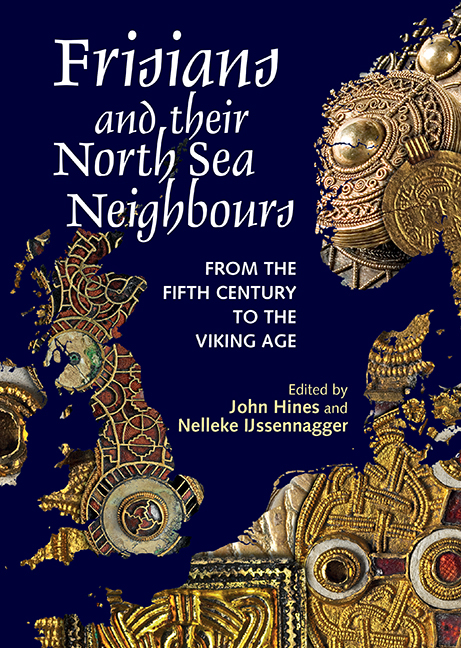Book contents
- Frontmatter
- Contents
- List of Figures
- List of Tables
- Preface
- Acknowledgements
- Linguistic Conventions and Abbreviations
- Abstracts
- Introduction: Frisians – Who, When, Where, Why?
- 1 Palaeogeography and People: Historical Frisians in an archaeological light
- 2 The Anglo-Frisian Question
- 3 Frisian between the Roman and the Early Medieval Periods: Language contact, Celts and Romans
- 4 ‘All quiet on the Western Front?’ The Western Netherlands and the ‘North Sea Culture’ in the Migration Period
- 5 Power and Identity in the Southern North Sea Area: The Migration and Merovingian Periods
- 6 How ‘English’ is the Early Frisian Runic Corpus? The evidence of sounds and forms
- 7 The Geography and Dialects of Old Saxon: River-basin communication networks and the distributional patterns of North Sea Germanic features in Old Saxon
- 8 Between Sievern and Gudendorf: Enclosed sites in the north-western Elbe–Weser triangle and their significance in respect of society, communication and migration during the Roman Iron Age and Migration Period
- 9 Cultural Convergence in a Maritime Context: Language and material culture as parallel phenomena in the early-medieval southern North Sea region
- 10 The Kingdom of East Anglia, Frisia and Continental Connections, c. ad 600–900
- 11 A Comparison of the Injury Tariffs in the Early Kentish and the Frisian Law Codes
- 12 Cultural Contacts between the Western Baltic, the North Sea Region and Scandinavia: Attributing runic finds to runic traditions and corpora of the Early Viking Age
- Index
2 - The Anglo-Frisian Question
Published online by Cambridge University Press: 25 August 2018
- Frontmatter
- Contents
- List of Figures
- List of Tables
- Preface
- Acknowledgements
- Linguistic Conventions and Abbreviations
- Abstracts
- Introduction: Frisians – Who, When, Where, Why?
- 1 Palaeogeography and People: Historical Frisians in an archaeological light
- 2 The Anglo-Frisian Question
- 3 Frisian between the Roman and the Early Medieval Periods: Language contact, Celts and Romans
- 4 ‘All quiet on the Western Front?’ The Western Netherlands and the ‘North Sea Culture’ in the Migration Period
- 5 Power and Identity in the Southern North Sea Area: The Migration and Merovingian Periods
- 6 How ‘English’ is the Early Frisian Runic Corpus? The evidence of sounds and forms
- 7 The Geography and Dialects of Old Saxon: River-basin communication networks and the distributional patterns of North Sea Germanic features in Old Saxon
- 8 Between Sievern and Gudendorf: Enclosed sites in the north-western Elbe–Weser triangle and their significance in respect of society, communication and migration during the Roman Iron Age and Migration Period
- 9 Cultural Convergence in a Maritime Context: Language and material culture as parallel phenomena in the early-medieval southern North Sea region
- 10 The Kingdom of East Anglia, Frisia and Continental Connections, c. ad 600–900
- 11 A Comparison of the Injury Tariffs in the Early Kentish and the Frisian Law Codes
- 12 Cultural Contacts between the Western Baltic, the North Sea Region and Scandinavia: Attributing runic finds to runic traditions and corpora of the Early Viking Age
- Index
Summary
A major issue in mid-19th-century European politics was the ‘Schleswig-Holstein question’, of which the later British Prime Minister and former Foreign Secretary Lord Palmerston is famously alleged to have said:
Only three people were completely acquainted with the truth: the Prince Consort, who is dead; a German professor, who is in a lunatic asylum; and I, who have forgotten all about it.
The disputed matters in fact involved the succession to the dukedoms of Schleswig and Holstein, and the conflicting interests of the Danish crown and Prussian/German nationalists. The anecdote of Palmerston's quip is, alas, probably apocryphal: it emerged in the earlier twentieth century, when, not least in the shadow of the Great War, it was intellectually fashionable to caricature the Victorian statesman as a laconic patrician (Grant Robertson 1918, 156; Strachey 1921, 308; cf. Lorne 1892, 210 and 221–2). The Anglo-Frisian question may not be as arcane as the Schleswig-Holstein question, nor as amenable to exploitation for either political or satirical ambitions of this scale. Nonetheless the analogy is more than merely playful, in that clarifying what exactly the problem is, is indeed the key issue.
Of course, there cannot be just one question, or one answer. On the contrary, even the most superficial idea of what might be meant by the Anglo-Frisian question is likely to involve recognition of the fact that close similarities between England and Frisia, two areas only around a hundred sea-miles apart across the North Sea, exist in quite diverse features of the populations and their cultures: their language; aspects of their material culture; their early laws; and more. An initial proposal for how to formulate the question could therefore be whether there is any deeper explanation for these similarities other than proximity. Is there, very simply, anything special in the relationship, either in terms of its origins or in terms of its role? After all, both England and Frisia have long been equally close neighbours to the French people and state, and to the Francophone Continent, yet with clear contrasts in most of the cultural characteristics which can be claimed to show some degree of ‘Anglo-Frisian’ relationship.
- Type
- Chapter
- Information
- Frisians and their North Sea NeighboursFrom the Fifth Century to the Viking Age, pp. 25 - 42Publisher: Boydell & BrewerPrint publication year: 2017
- 1
- Cited by



